#Han Dynasty
Text

Jake Disventure Camp God edition
#cereza made art#my art#disventure camp#campamento desventura#disventure camp jake#dc jake#yes I do believe he’s Chinese shut UP#HAN DYNASTY INSPIRED HANFU#han dynasty#hanfu#ohhhhh he’s a god#god god god#disventure camp all stars#campamento desventura Jake#yup#I really wanted to draw him based on that one chang’e artwork and merged both of them#extremely stylised might I add#I have assignments due and I did this instead
31 notes
·
View notes
Text
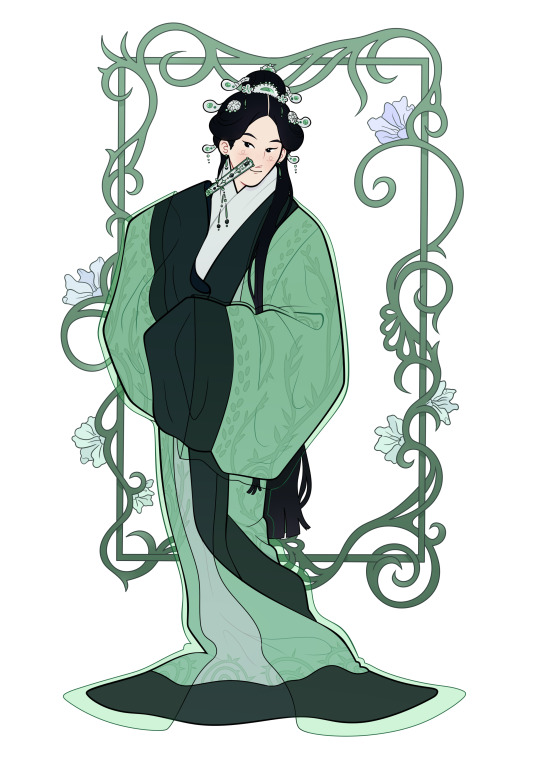
Notification: The peerless jade fairy of Cang Qiong's Mountain Sect is smiling! Looks like he's easily amused by his disciples' antics...!!! What a surprise!!! +300 Overwhelming Beauty Points!
Ok now for my silly little notes in fashion and other nonsense about this piece:
This is specifically Shen Yuan during the pre-abyss arc, mostly because I have a very, very different interpretation of him when he's already married to Binghe- Empress Shen is a whole other, much more decked out beast I will one day tackle.
His clothes are based on late Qin to early Han dynasty clothes for women, mostly because I can, and it seemed perfect for him; it's completely covered, and thus respectable and elegant! Nothing wrong to see here. It's also tight-er around the legs, which leaves things to the imagination...half of the mountain is definitely thinking about his long, slender, lily-white legs at any given time.
Is it technically crossdressing? Yeah, but it is a shitty Xia-Xia world, who's gonna stop me? Airplane? That guy would be on my side, actually.
The see-through outer robe is a flex, look at all that expensive fabric...just hanging off of him...a rich kid in one life a rich kid in all of them.
Binghe does his hair because he's terrible at it and can only do half-updo's or ponytails, he's too distracted by the mere thought of touching Shizun's hair to stop and think why Shen Qingqiu can't do it all of a sudden thankfully.
The hair, on a more serious note, is a bit more realistic to ancient-Chinese hair than an actual half-updo. Though it is more similar to late Han or Tang dynasties hairstyles than anything. Again, shitty Xia-Xia, don't play with me.
There's a little turtle in his fan because I think he'd be like awn that's so cute and either Liu Qingge or Yue QingYuan would be immediately like. I'll buy it!!! He acquires many-a-thing by simply looking cute and staring at it until one of them gets it for him I'm sure.
#art#digital art#artists on tumblr#my art#fanart#svsss#scum villain fanart#scum villain#scum villian self saving system#shen qingqiu#shen yuan#peerless cucumber#cucumber bro#han dynasty#chinese hanfu#hanfu accessories
683 notes
·
View notes
Text
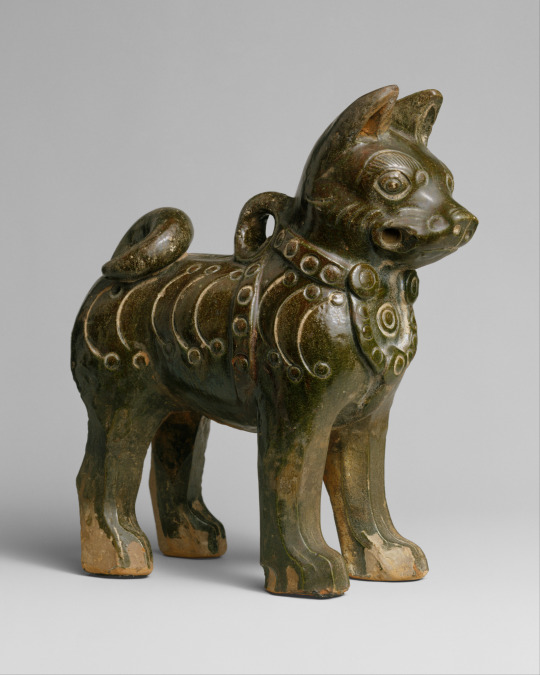
Earthenware figurine of a dog, China, Eastern Han Dynasty 25-220 AD
from The Metropolitan Museum of Art
2K notes
·
View notes
Text
[Hanfu · 漢服]The relationship between women in history is not just love rivals,
“but also thousands of years later, everyone knows that it is me and you.”
Let's get to know about them/她们 in China history.
1.【Han Dynasty】:Princess Jieyou (解忧公主) & Feng Liao (馮嫽)
Princess Jieyou (Chinese: 解忧公主; 121 BC – 49 BC), born Liu Jieyou (Chinese: 刘解忧), was a Chinese princess sent to marry the leader of the Wusun kingdom as part of the Western Han Chinese policy of heqin(和亲).
As the granddaughter of the disgraced Prince Liu Wu (劉戊) who had taken part in the disastrous Rebellion of the Seven States,her status was low enough that she was sent to replace Princess Liu Xijun (劉細君) after her untimely death and marry the Wusun king Cunzhou (岑陬).
Jieyou lived among the Wusun for fifty years and did much work to foster relations between the surrounding kingdoms and the Han. She was particularly reliant upon her attendant, Feng Liao, whom she dispatched as an emissary to Wusun kingdoms and even to the Han Court. She faced opposition from pro-Xiongnu members of the Wusun royalty, particularly Wengguimi’s Xiongnu wife. When word came that the Xiongnu planned to attack Wusun, she convinced her husband to send for aid from the Han Emperor. Emperor Wu of Han sent 150,000 cavalrymen to support the Wusun forces and drive back the Xiongnu.
In 51 BCE at the age of 70, Jieyou asked to be allowed to retire and return to the Han. Emperor Xuan of Han agreed and had her escorted back to Chang'an where she was welcomed with honor. She was given a grand palace with servants usually reserved for princesses of the imperial family. In 49 BCE, Jieyou died peacefully.
Feng Liao (馮嫽)
Feng Liao (馮嫽) was China's first official female diplomat,[citation needed] who represented the Han dynasty to Wusun (烏孫), which was in the Western Regions. It was a practice for the Imperial Court to foster alliances with the northern tribes via marriage, and two Han princesses had married Wusun kings.
Feng Liao was the maidservant of Princess Jieyou (解憂公主), who was married off to a Wusun king. Feng herself later married an influential Wusun general, whose good standing with Prince Wujiutu (烏就屠) of the kingdom later proved beneficial to the Han dynasty.
When Prince Wujiutu seized the throne of Wusun in 64 BC, after his father died, there was fear in the Imperial Court of Han that Wujiutu, whose mother was Xiongnu, would allow Wusun to become Xiongnu's vassal.
Zheng Ji, Governor of the Western Regions, recalled that Feng Liao had married into Wusun and with her familiarity of the Wusun customs, she was a prime candidate to persuade Wujiutu to ally his kingdom with Han. Wujiutu acceded and Emperor Xuan of Han (漢宣帝) sent for Feng. He praised her for her judgement and diplomacy, and appointed her as the official envoy to Wusun.
Wujiutu was conferred the title "Little King of Wusun" while his brother, the son by a Han princess, was named "Great King of Wusun". Wusun was divided between the two kings and tensions in that region were eased.
※Xiongnu: Xiongnu: A nomadic tribe that has occupied northern China for a long time. Later it gradually became a state. It harassed the borders of the Han Dynasty for a long time and robbed supplies.
------
With their efforts, the Wusun Kingdom gradually tended to support the Han Dynasty, and the Xiongnu's defeat in China also began.
------
2.【Tang Dynasty】:Shangguan Wan'er(上官婉儿)&Princess Taiping (太平公主)
Shangguan Wan'er/上官婉儿 (664 – 21 July 710) was a Chinese politician, poet, and imperial consort of the Wu Zhou and Tang dynasties. Described as a "female prime minister,"Shangguan rose from modest origins as a palace servant to become secretary and leading advisor to Empress Wu Zetian of Zhou. Under Empress Wu, Shangguan exercised responsibility for drafting imperial edicts and earned approbation for her writing style. She retained her influence as consort to Wu's son and successor, Emperor Zhongzong of Tang, holding the imperial consort rank of Zhaorong (昭容). Shangguan was also highly esteemed for her talent as a poet.Shangguan was also highly esteemed for her talent as a poet. In 710, after Emperor Zhongzong's death, Shangguan was killed during a palace coup that ended the regency of Empress Dowager Wei.
Princess Taiping (太平公主)lit. "Princess of Great Peace", personal name unknown, possibly Li Lingyue (李令月) (after 662 – 2 August 713) was a royal princess and prominent political figure of the Tang dynasty and her mother Wu Zetian's Zhou dynasty. She was the youngest daughter of Wu Zetian and Emperor Gaozong and was influential during the reigns of her mother and her elder brothers Emperor Zhongzong and Emperor Ruizong (both of whom reigned twice), particularly during Emperor Ruizong's second reign, when for three years until her death, she was the real power behind the throne.
She is the most famous and influential princess of the Tang dynasty and possibly in the whole history of China thanks to her power, ability and ambition. She was involved in political difficulties and developments during the reigns of her mother and brothers. Indeed, after the coup against Empress Dowager Wei, she became the real ruler of Tang. During the reign of Emperor Ruizong, she was not restricted by anything, the emperor issued rulings based on her views and the courtiers and the military flattered her and majority from every civil and military class joined her faction, so her power exceeded that of the emperor.
Eventually, however, a rivalry developed between her and her nephew, Emperor Ruizong's son, Crown Prince Li Longji. Both of them were hostile in power-sharing and they fought for the monopoly over power. After Emperor Ruizong yielded the throne to Li Longji (as Emperor Xuanzong) in 712, the conflict came to the political forefront, and openly, the court became a manifestation of conspiracy rather than the administration of the empire; in 713, Emperor Xuanzong, according to historical records, believing that she was planning to overthrow him, acted first, executing a large number of her powerful allies and forcing her to commit suicide.
------
The relationship between Shangguan Wan'er and Princess Taiping has always been written as "enemies" in official history, but with the phrase "千年万岁,椒花颂声", their friendship that has been buried for thousands of years was revealed.
The"千年万岁,椒花颂声" sentence comes from the epitaph written by Princess Taiping for Shangguan Wan'er. The original text is: "潇湘水断,宛委山倾,珠沉圆折,玉碎连城。甫瞻松槚,静听坟茔,千年万岁,椒花颂声”
Translation: Now that you are far away, the sky and the earth will lose their color. I'm afraid that all I can do in the future is to sit and look at the tea tree in front of your tomb. Maybe I can hear your voice again when I stand within an inch of the tomb. But this is a delusion after all, a quiet tomb, no beautiful face, a empty place of death. I hope that in a thousand or ten thousand years, there will still be people like me who remember you.
------
3.【Late Qing Dynasty】:Lü Bicheng(呂碧城) & Qiu Jin (秋瑾)
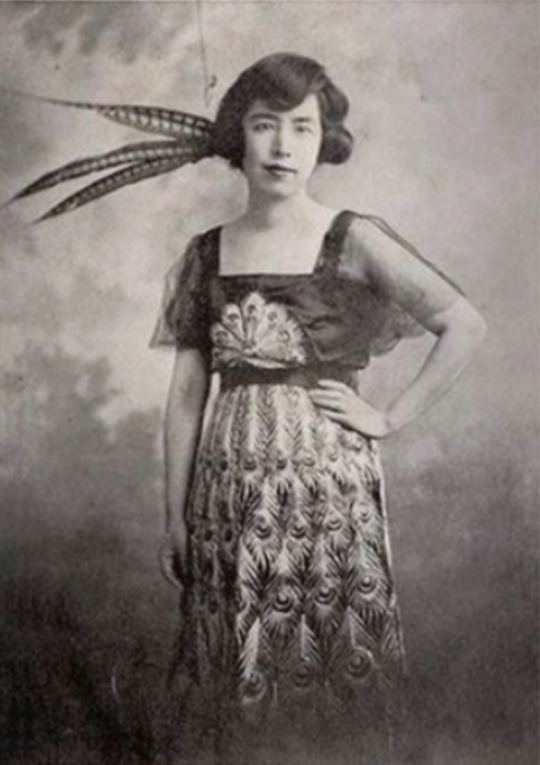
Lü Bicheng(呂碧城)also known as Alice Pichen Lee(1883–1943) was a Chinese writer, activist, newspaper editor, poet and school founder. She has been mentioned as one of the top four women in literature from the early Republic of China.
When she was four, her father retired to Lu'an, Anhui. She lived a life of comfort until the age of 12, when her father died in 1895. Because Lü Fengqi had no male heir, relatives of the Lü lineage contested for his inheritance, and Yan Shiyu and her four daughters were forced to move to Lai'an County to live with her natal family. When she was nine, Lü Bicheng was betrothed to a Wang family, but as her own family fortune declined, the Wang family broke off the marriage contract, giving the young Bicheng the stigma of a "rejected woman". The resulting emotional scar is often considered a major factor in her later decision to never marry.[8] Her widowed mother and the Lü girls were not well treated at the Yan family in rural Anhui. When Lü was 15 or 16, Yan Shiyu sent her to live with her maternal uncle Yan Langxuan (嚴朗軒), who was the salt administrator in Tanggu, the port city outside the northern metropolis of Tianjin. Her sister Huiru also joined her later.
During her stay in Tanggu, Qing China went through the tumultuous period of the failed Hundred Days' Reform of 1898, which brought about increasing awareness of women's education, and the Boxer Rebellion of 1900. In 1904, Mrs. Fang, the wife of her uncle's secretary, invited Lü Bicheng to visit a girls' school in Tianjin, but her uncle prevented her from going and severely reprimanded her. The next day, she ran away from her uncle's home, and took the train to Tianjin with no money or luggage. She wrote a letter to Mrs. Fang, who was staying at the dormitory of the Ta Kung Pao newspaper. Ying Lianzhi, the Catholic Manchu nobleman who founded the newspaper, read the letter and was so impressed by it that he made her an assistant editor. Lü Bicheng wrote a "progressive" ci that she had previously written, set to "A River Full of Red" ("Manjianghong") usually used to express heroic emotions. Ying transcribed the whole song in her diary and published it in L'impartial two days later. At the time, it was sensational for a woman to write for an influential national newspaper such as Ta Kung Pao. She was 21 years old. She used Ta Kung Pao to promote feminism and became a well-known figure.
Lü's ci poetry was published in the newspaper and it was very well received. She was the chief editor of the newspaper from 1904 to 1908. In 1904 she decided to improve education for girls. She had published her thoughts on women's rights and the general editor of the newspaper introduced her to Yan Fu who was an advocate for Western ideas. The Beiyang Women's Normal School was established that same year. At 23 Lü took on the job of principal of the school she had founded two years before. At first this school found it difficult to find girls who qualified for secondary education and students were brought in from Shanghai to make up the numbers.
Lü knew the revolutionary Qiu Jin and they had similar objectives but Lü did not join her in Japan when she was invited as she was unsure whether women should meddle in politics. She was then chosen to be secretary to Yuan Shikai, one of the most powerful people in China. When he set out to declare himself emperor of China she left, like many of his followers, and abandoned him.
--

Qiu Jin (秋瑾)8 November 1875 – 15 July 1907,was a Chinese revolutionary, feminist, and writer.Her sobriquet name is Jianhu Nüxia (Chinese: 鑑湖女俠 lit. 'Woman Knight of Mirror Lake').
Qiu was born into a wealthy family. Her grandfather worked in the Xiamen city government and was responsible for the city's defense. Zhejiang province was famous for female education, and Qiu Jin had support from her family when she was young to pursue her educational interests. Her father, Qiu Shounan, was a government official and her mother came from a distinguished literati-official family. Qiu Jin's wealthy and educated background, along with her early exposure to political ideologies were key factors in her transformation to becoming a female pioneer for the woman's liberation movement and the republican revolution in China.
In the early 1900s, Japan had started to experience western influences earlier than China. As to not fall behind, the Qing government sent many elites to learn from the Japanese. Qiu Jin was one of these elites that got the chance to study overseas. After studying in a women's school in Japan, Qiu returned to China to participate in a variety of revolutionary activities; and through her involvement with these activities, it became clear how Qiu wanted others to perceive her. Qiu called herself 'Female Knight-Errant of Jian Lake' — the role of the knight-errant, established in the Han dynasty, was a prototypically male figure known for swordsmanship, bravery, faithfulness, and self-sacrifice — and 'Vying for Heroism'
Qiu Jin had her feet bound and began writing poetry at an early age. With the support from her family, Qiu Jin also learned how to ride a horse, use a sword, and drink wine—activities that usually only men were permitted to learn at the time.In 1896 Qiu Jin got married. At the time she was only 21, which was considered late for a woman of that time. Qiu Jin's father arranged her marriage to Wang Tingchun, the youngest son of a wealthy merchant in Hunan province. Qiu Jin did not get along well with her husband, as her husband only cared about enjoying himself.While in an unhappy marriage, Qiu came into contact with new ideas. The failure of her marriage affected her decisions later on, including choosing to study in Japan.
While still in Tokyo, Qiu single-handedly edited a journal, Vernacular Journal (Baihua Bao). A number of issues were published using vernacular Chinese as a medium of revolutionary propaganda. In one issue, Qiu wrote A Respectful Proclamation to China's 200 Million Women Comrades, a manifesto within which she lamented the problems caused by bound feet��and oppressive marriages. Having suffered from both ordeals herself, Qiu explained her experience in the manifesto and received an overwhelmingly sympathetic response from her readers. Also outlined in the manifesto was Qiu's belief that a better future for women lay under a Western-type government instead of the Qing government that was in power at the time. She joined forces with her cousin Xu Xilin and together they worked to unite many secret revolutionary societies to work together for the overthrow of the Qing dynasty.
Between 1905 and 1907, Qiu Jin was also writing a novel called Stones of the Jingwei Bird in traditional ballad form, a type of literature often composed by women for women audiences. The novel describes the relationship between five wealthy women who decide to flee their families and the arranged marriages awaiting them in order to study and join revolutionary activities in Tokyo. Titles for the later uncompleted chapters suggest that the women will go on to talk about “education, manufacturing, military activities, speechmaking, and direct political action, eventually overthrowing the Qing dynasty and establishing a republic” — all of which were subject matters that Qiu either participated in or advocated for.
Life after returning to China
Qiu Jin was known as an eloquent orator who spoke out for women's rights, such as the freedom to marry, freedom of education, and abolishment of the practice of foot binding. In 1906 she founded China Women's News (Zhongguo nü bao), a radical women's journal with another female poet, Xu Zihua in Shanghai. They published only two issues before it was closed by the authorities. In 1907, she became head of the Datong school in Shaoxing, ostensibly a school for sport teachers, but really intended for the military training of revolutionaries[citation needed]. While teaching in Datong school, she kept secret connection with local underground organization—The Restoration Society. This organization aimed to overthrow the Manchu government and restore Chinese rule.
Death
In 1907, Xu Xilin, Qiu’s friend and the Datong school’s co-founder was executed for attempting to assassinate his Manchu superior. In the same year, the authorities arrested Qiu at the school for girls where she was the principal. She was tortured but refused to admit her involvement in the plot. Instead the authorities used her own writings as incrimination against her and, a few days later, she was publicly beheaded in her home village, Shanyin, at the age of 31. Her last written words, her death poem, uses the literal meaning of her name, Autumn Gem, to lament of the failed revolution that she would never see take place:
秋風秋雨愁煞人
(Autumn wind, autumn rain — they make one die of sorrow)
After Qiu Jin was killed, no one dared to collect her body. Lu Bicheng endured her grief and took great risks to bury her friend. The guarding Qing army learned that the woman who came to collect the corpse was Lu Bicheng, who was famous in China, and they had no choice but to do anything.
Qiu Jin's death caused Lu Bicheng to lose a rare confidant in life. She wrote many poems in memory of Qiu Jin, recalling this like-minded friend.
Later, Lü Bicheng wrote "The Biography of the Revolutionary Heroine Qiu Jin" in English, which was published in newspapers in New York, Chicago and other places in the United States. It caused a great response and not only made many people in the world know about Qiu Jin's legendary story, but also published it in newspapers in New York and Chicago. It also makes people understand the darkness and corrupt social status quo of the Qing Dynasty. Lu Bicheng used a pen of her own to record her friendship with Qiu Jin, and also fulfilled her promise to Qiu Jin to respond with the "battle of words"
————————
📸Video & 🧚🏻 Model:@荷里寒 & @阿时Ashi_
🔗Weibo:https://weibo.com/3618951560/NEZZnpQRq
————————
#chinese hanfu#china history#woman power#woman in history#hanfu#hanfu accessories#hanfu_challenge#chinese traditional clothing#china#chinese#han dynasty#tang dynasty#late qing dynasty#feminism#revolution#漢服#汉服#中華風#girl power#hanfu girl
357 notes
·
View notes
Text
[餘智傳] The 2nd Century Warlord (Part 2)
based on the story by @romanceyourdemons
Read part 1

ninth day as a second century warlord i try to tactfully ask my fake liege lord if he sent the assassin to kill my loser liege lord and it turns out the idea of using assassins never occurred to him, but now that i’ve suggested it he’s really into it. in order to save my loser liege lord i volunteer to be the one to kill him
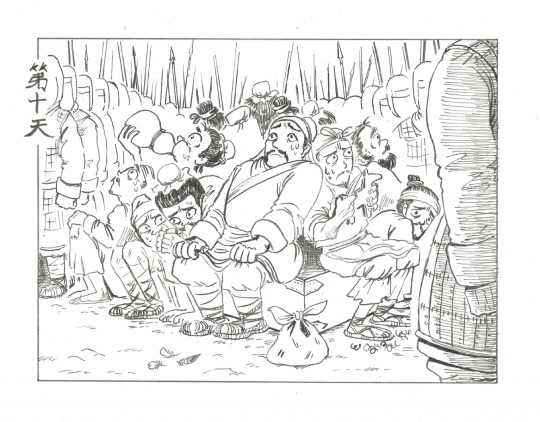
tenth day as a second century warlord on my way back to my loser liege lord’s city i realize i won’t be able to collect my men from my fake liege lord until i bring back my loser liege lord’s head. this would have been a great thing to think of before i got myself in this situation. i go back to my loser liege lord and ask him to rescue my men, and he tells me that if he could sack my fake liege lord’s camp he already would have. that doesn’t change the fact that my men are still trapped. they’re prisoners, even. i go back to my room to sulk
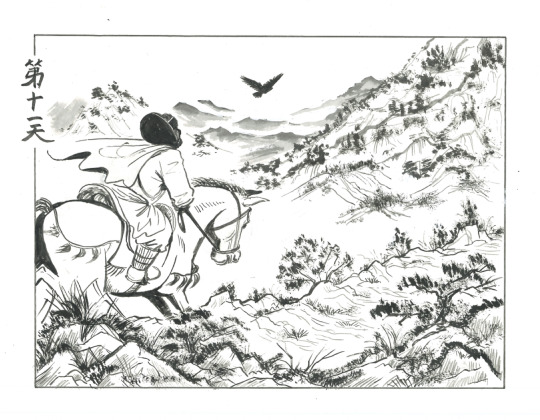
eleventh day as a second century warlord i find a little caged pigeon in the rafters of my loser liege lord’s room and deduce it belonged to the assassin. without asking permission or telling my loser liege lord goodbye i let the pigeon loose and follow it north. don’t ask what i was doing in my loser liege lord’s room. it’s not important
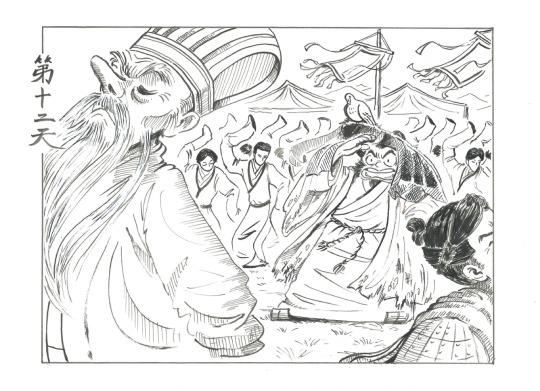
twelfth day as a second century warlord i disguise myself as a wizard and enter the camp of the coalition leader the pigeon led me to. in the middle of my little sleight of hand performance i make eye contact with the coalition leader’s second-in-command. IT’S THE WIZARD THAT STOLE MY LOSER LIEGE LORD’S WIFE. after the banquet i corner the fake wizard and ask him what the fuck is going on and he just says “wouldn’t you like to know” and leaves. i don’t know what to say to that so i just let him go

thirteenth day as a second century warlord i’m honestly so sick of not knowing what’s going on, so i adjust my wizard costume to passably disguise myself as a woman and break into the women’s area of the camp, where sure enough my loser liege lord’s wife is. i ask her what she’s doing here and she tells me the fake wizard overheard her singing a poem she overheard on the street, not knowing it contains the coalition leader’s formation’s weaknesses. the fake wizard kidnapped her and assigned an assassin to kill her husband before they figured out the poem’s significance. she shares the first couplet with me but i’m discovered and thrown out before she can share any more. she doesn’t need to. through a bizarre coincidence of homophones, it’s the poop version of my misinformation nursery rhyme
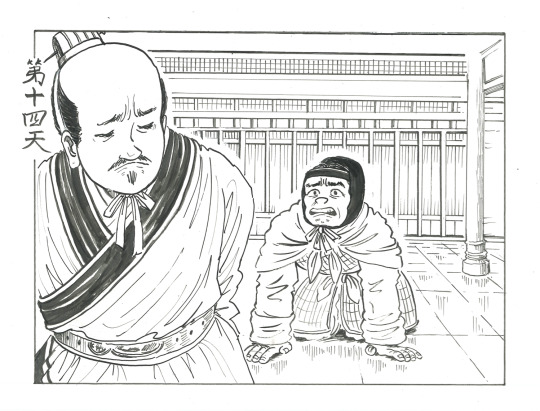
fourteenth day as a second century warlord i go back to my loser liege lord and tell him everything, urging him to join with my fake liege lord to attack the coalition leader according to the weaknesses in the nursery rhyme. he tells me frankly that he doesn’t trust me anymore. i ask him to execute me if that’s really true, because i can’t bear to live if i can’t protect him and i can’t protect my men. he agrees to attack the coalition leader

fifteenth day as a second century warlord. due to the information in the nursery rhyme, and thanks to my loser liege lord reminding me of the weather conditions multiple times while planning our battle strategy, our alliance carries the day. my loser liege lord gets his wife back. my men tell me that our fake liege lord actually treated them really well and they’d like to stay with him if i don’t mind. i do mind, now that neither the men i love nor the man i love have any use for me, but i don’t tell them that
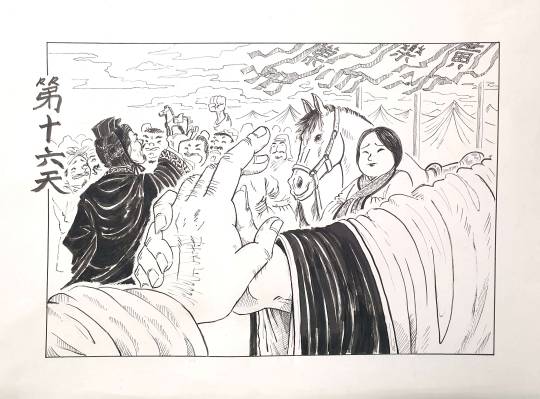
sixteenth day as a second century warlord i’m preparing to leave to i don’t know where, maybe to try to become a wizard for real, when my loser liege lord stops me and asks me where i’m going. he says he had hoped i would continue to work as his advisor. i was unaware i was his advisor in the first place. i agree, and he tells me he’s truly honored to have me in his service at last. he has known i am a rare and talented man with a strategic intelligence far above his ever since the day he witnessed me tying branches to my horses’ tails in six inches of mud, and could not for the life of him figure out why
The end.
Thanks for reading! Notes under the cut
CORRECTION#1: the warlord's courtesy name was incorrectly written as Yú zhī 餘知 [plentiful knowledge]. my dumbass did not realise zhī 知 [to know] is a GOD DAMN VERB. It should be zhì 智 [wisdom].
CORRECTION#2: the clothes from part one are from the WRONG DYNASTY!!! BY 1200 YEARS!!!! it's meant to be HAN not MING.
#9 Misreading the standards: Loser Liege's name is Yue, so I decided to go with Lè/Yuè 樂 [optimistic/music]. I made the Chad Liege's name Cháo 巢 [nest] which is pronounced identically to Cáo 曹, the infamous IRL warlord. Just like his IRL counterpart, he is the affable, lawful-evil boss who is kind to his employees. I went ALL OUT designing Lord Chad Chao's outfit. He's got so much drip the yangtze river is about to break its banks. Now THAT'S a main character!
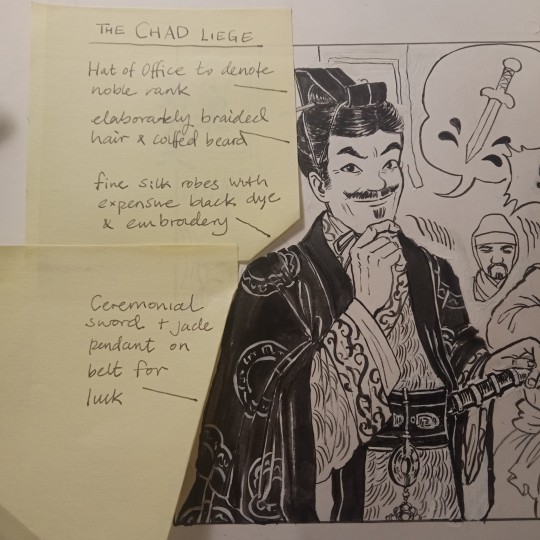
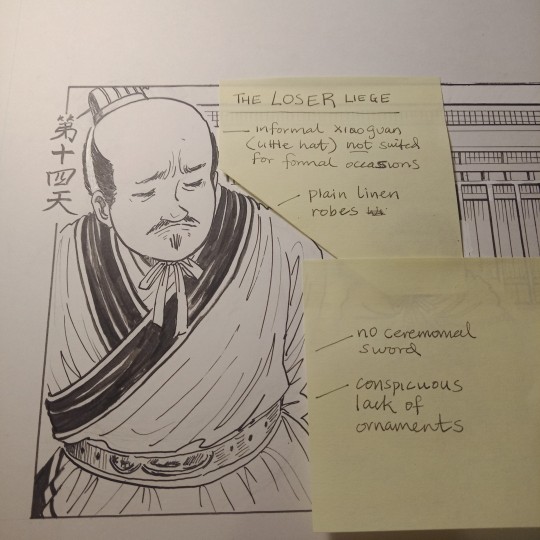
#10 Wardrobe Malfunction: the soldiers are now wearing clothes from the correct dynasty. i even gave them grass sandals! I really wanted to show how utterly outclassed they are, this is the difference between a peasant militia and a professional army. (They're in the exact same poses as part 1, except more terrified).
#11 mountain-water art: man i love doing traditional style backgrounds, the white space is very pleasing. Does it make sense to camp your coalition out in the mountains? No. Is it cool? Hella.
#12 you're a wizard, hairy: my favourite detail is the pigeon from day 11 sitting on the warlord's hat. I had to cut SO MUCH from this scene because there wasn't room. There was going to be musicians, jesters and strongmen. (Based of funerary figures)
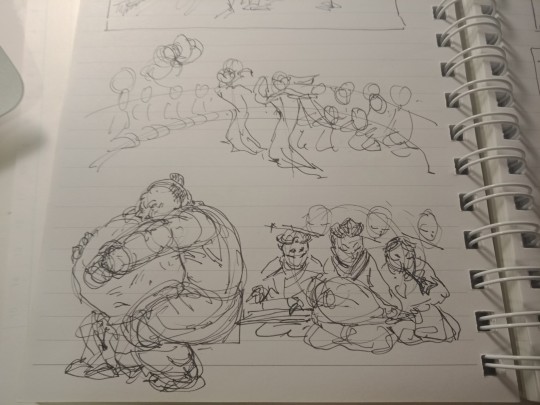


I wanted to make it clear that the Coalition Liege is the richest guy of all, but he is all style and no substance. He's got an army of dancing girls and drunk officers. You get the feeling that his Chief Strategist aka Fake Wizard aka Zhuge Liang Knockoff, disproves.
#13 Hua Mulan: RIP the Warlord's beautiful beard ;n; He's wearing one of the dancing girl's outfits and I like to think the ladies helped him do his makeup too. I wanted to add a little character moment for the Wife and Warlord. They're holding hands which is not strictly proper, but I wanted to show the intensity of the emotions.
#14 the supplicant: I really like the framing here, I wanted both faces to be visible so we can see what they're thinking.
#15 enemy of my enemy: the Warlord is finally in command and flying his standard Huáng 黃 [yellow]. He is wearing a wu guan with two pheasant feathers, for a high ranking military official.
#16 the romantic subplot: the Warlord and his Loser are tenderly holding hands while the Wife and Noble Steed looks on with approval. I wanted the handholding to be slightly awkward and kinda spontaneous, like they were both aiming for a manly, platonic hand-clasp but veered wildly off-course into homoeroticism. In the background, an oblivious Lord Chad is showing off the little wooden horse one of his new soldiers gave him (that guy's been carving it since part 1, it's high time we acknowledged his hard work).
Want to learn more about the (mostly) true story that inspired this post? Check out Romance of the Three Kingdoms! TV show, the book and the movie Red Cliff,
#second century warlord#han dynasty#romance of the three kingdoms#history#thanks for reading guys i had a blast drawing this
797 notes
·
View notes
Text


Bronze & Crystal Sword,
Warring States Period and Wudi Period of Han Dynasty (c. 4th-2nd century BC),
Chinese bronze sword with turquoise studded, gold inlaid rock crystal hilt.
Length 22.83 in / Width 3.15 in /
Collection & Credit: Cardale Auctioneers
#art#history#design#style#archeology#sculpture#gold#bronze#china#han dynasty#wudi period#crystal#turquoise#rock crystal#jewellery#jewelry
504 notes
·
View notes
Text

they call you a god
Clothing references!
Wooden Male Figure with a Hat - Western Han Dynasty - Unearthed from Tomb 1 at Mawangdui, Changsha

Plain Gauze Gown - Western Han Dynasty - Unearthed from Han Tomb No.1 at Mawangdui, Changsha
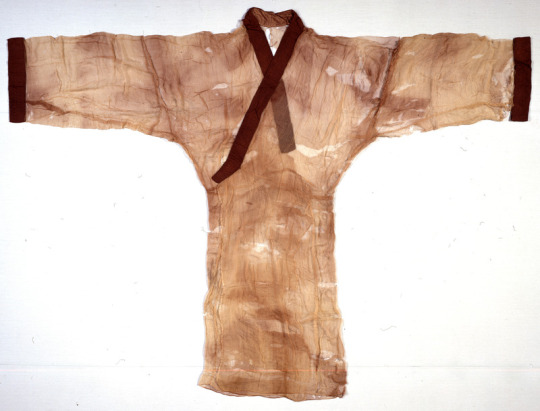
Jade ornament and guan are based on general stereotypical Han dynasty and guzhuang dress
415 notes
·
View notes
Text
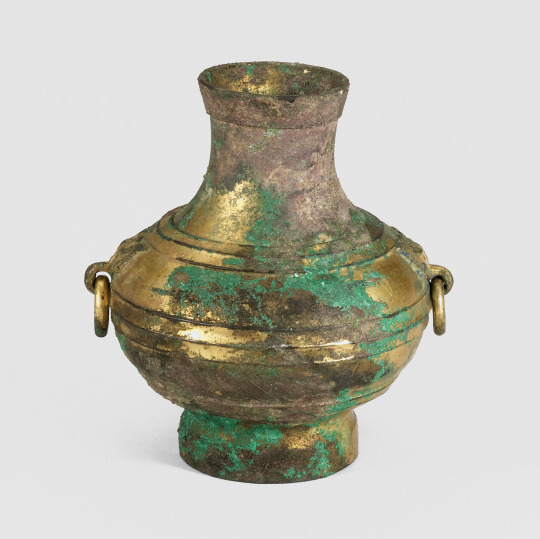
Wine Jar (Hu)
China, Style of Western Han dynasty (206 B.C.–A.D. 9), 2nd/1st century
56 notes
·
View notes
Text
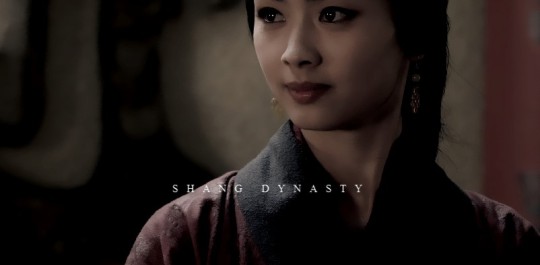
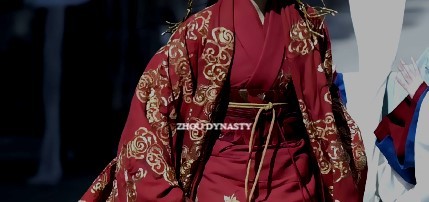
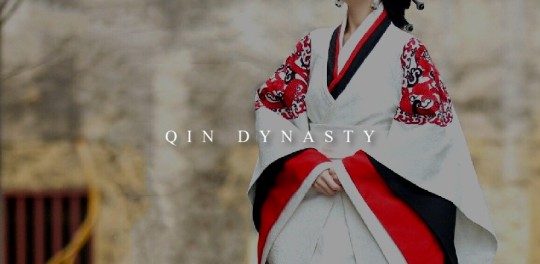

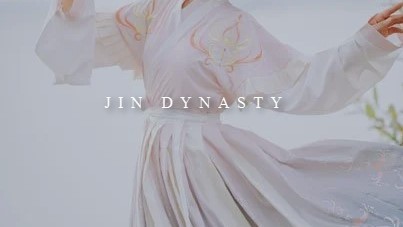

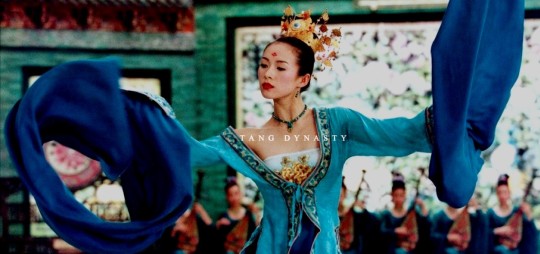


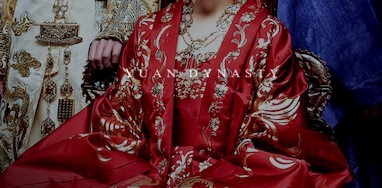
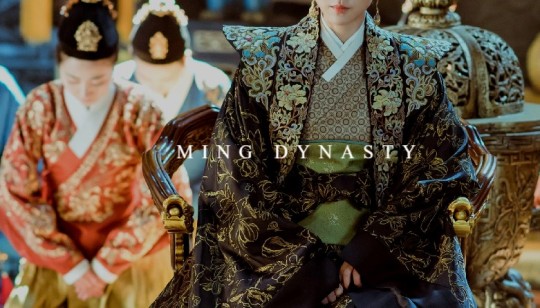
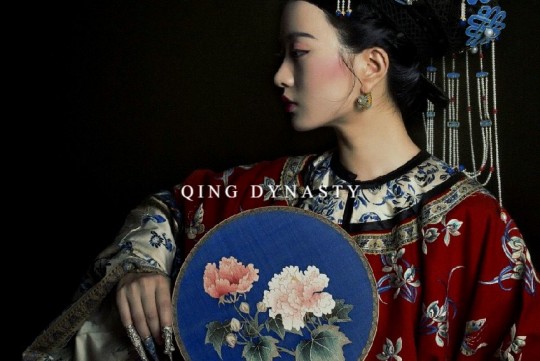
Chinese Dynasties.
Shang | Zhou | Qin | Han | Jin | Sui | Tang | Liao | Song | Yuan | Ming | Qing
#qing dynasty#han dynasty#qin dynasty#shang dynasty#ming dynasty#zhou dynasty#tang dynasty#yuan dynasty#song dynasty#jin dynasty#sui dynasty#liao dynasty#story of yanxi palace#ruyi's royal love in the palace#empress ki#house of the flying daggers#legend of xiao chuo#red cliff#zhao wei#the king's woman#legend of haolan
146 notes
·
View notes
Text
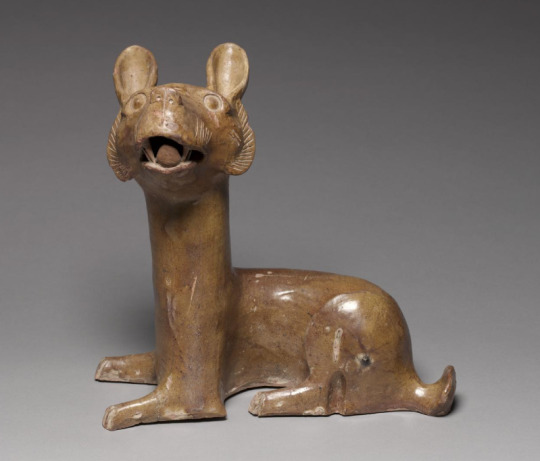
Earthenware dog, China, Eastern Han Dynasty 25-220 AD
from The Cleveland Museum of Art
518 notes
·
View notes
Text
After 1,800 years out of circulation, scientists finally identified the complex composition of a unique color created in ancient China. Used by the Qin and Han Dynasties to color wall paintings, ceramics, jewelry and even the famed terracotta warriors, the recipe was lost.
It was only in the 1990s that scientists finally discovered how to recreate the formula. But that wasn’t all they found. Researchers later exposed that the ancient pigment emits powerful rays of light in the near-infrared range, revealing hidden details invisible to the naked eye.
53 notes
·
View notes
Text

A Splendid And Rare Gold And Silver-Inlaid Parcel-Gilt Bronze Figure Of a Peacock. Han Dynasty.
94 notes
·
View notes
Photo
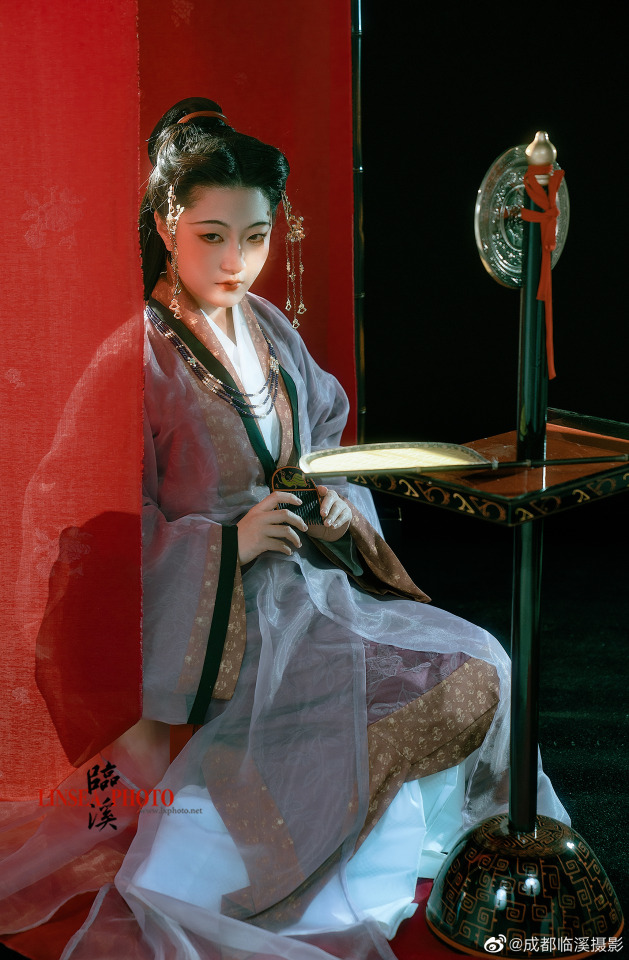
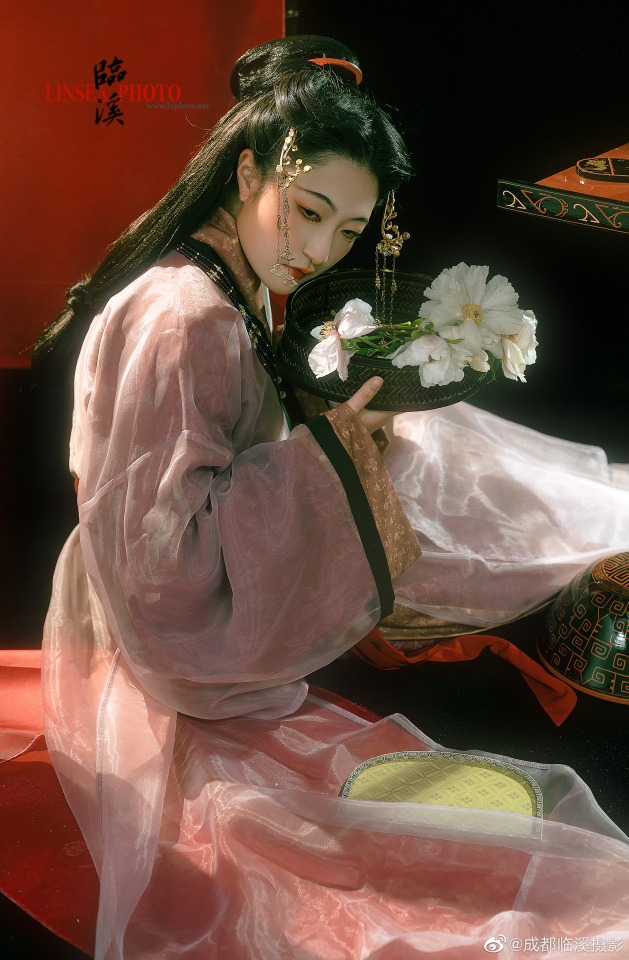
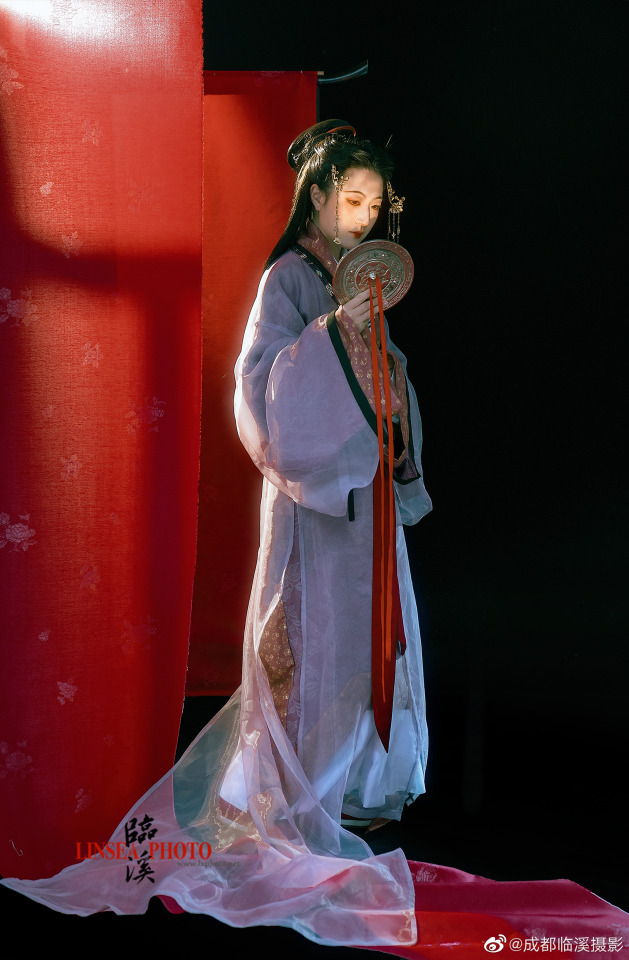
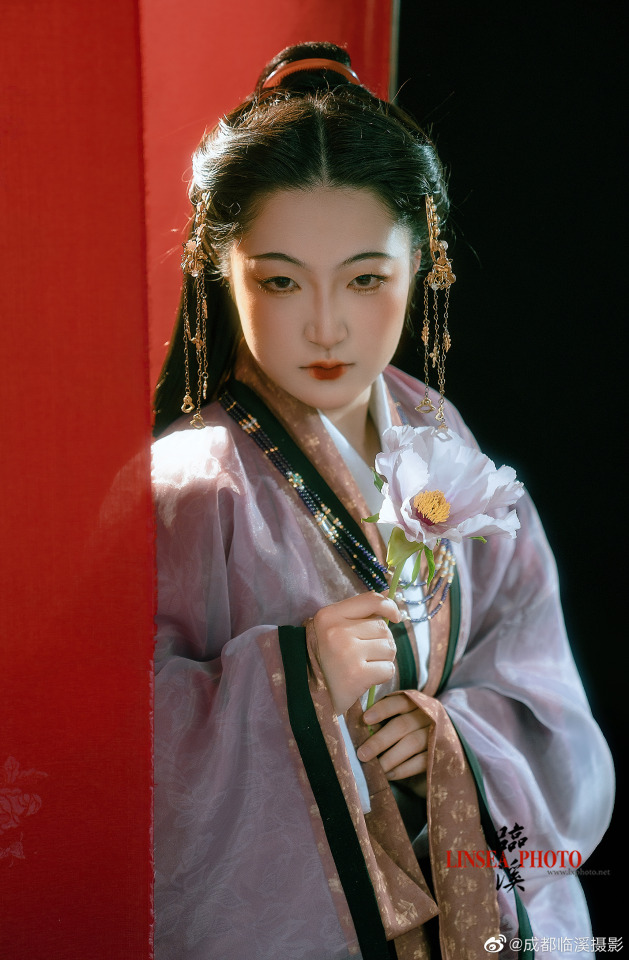
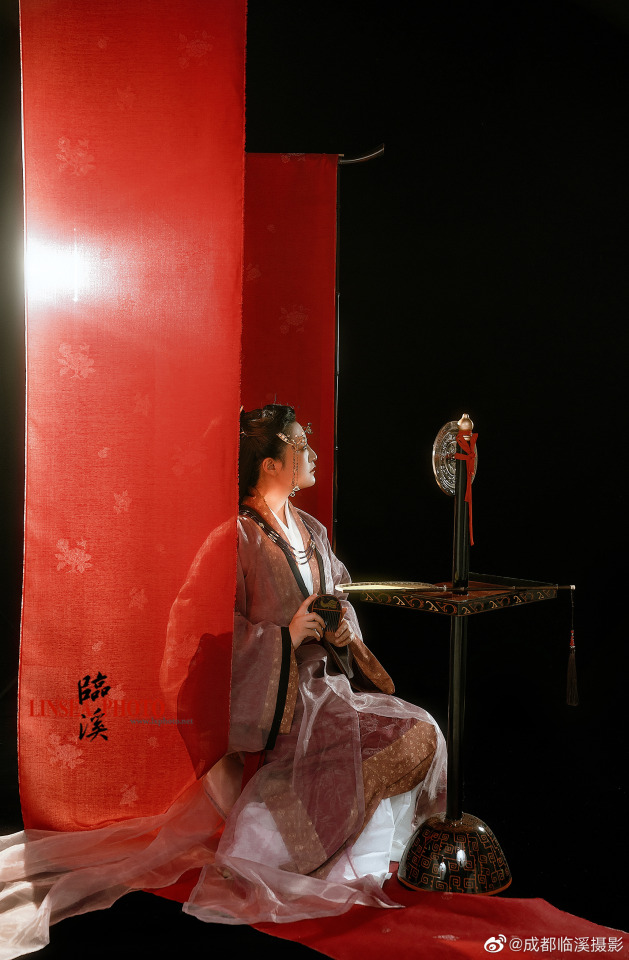
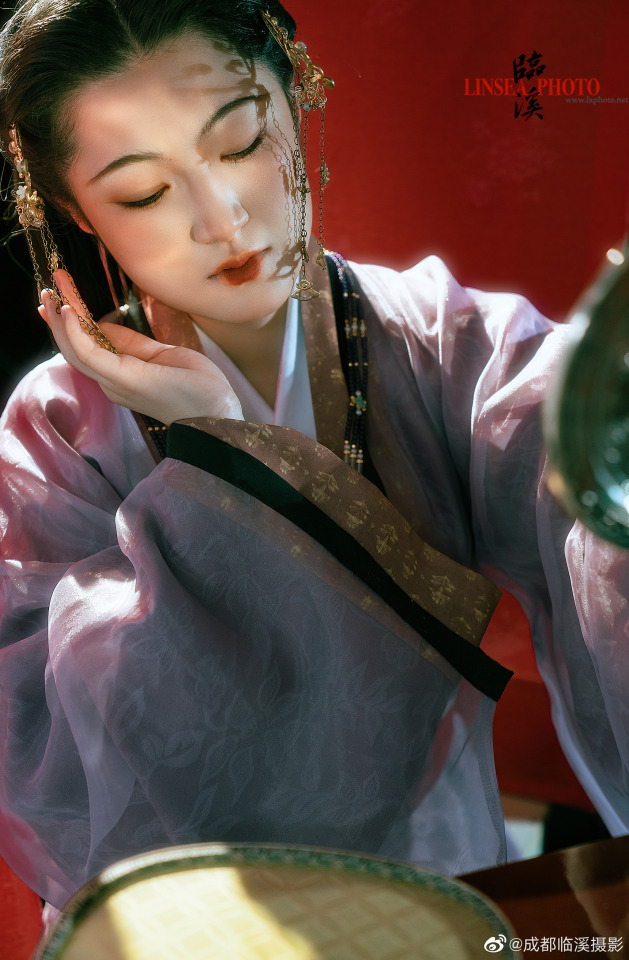
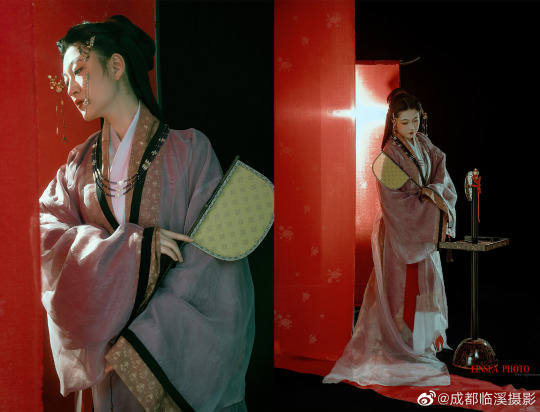
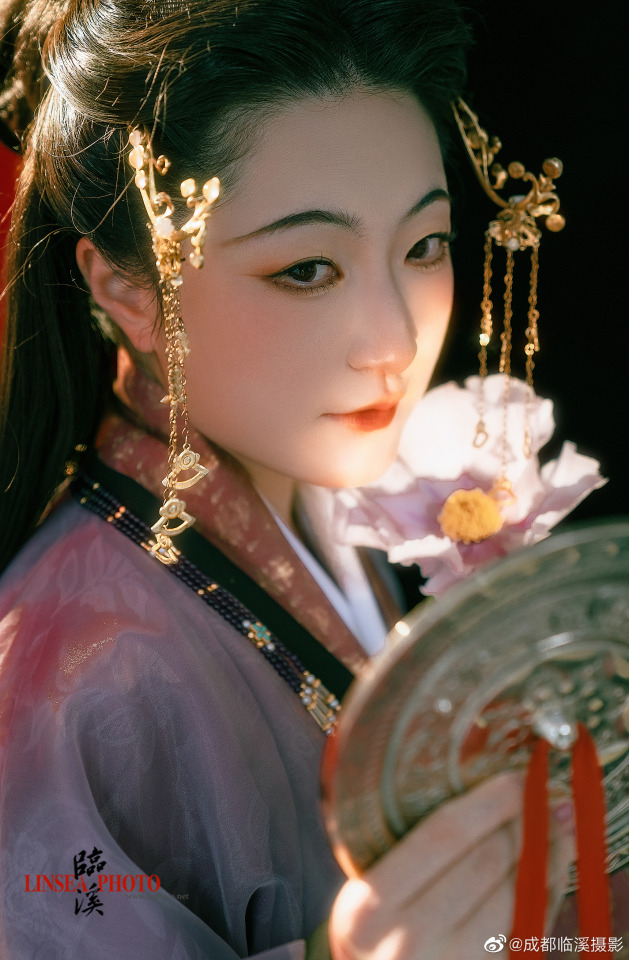
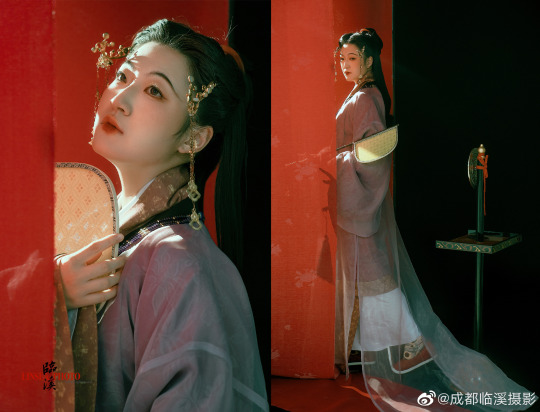
【Han Dynasty Artifact Reference】
China Western Han Dynasty Painted Female Figurines (early and middle period of Western Han)
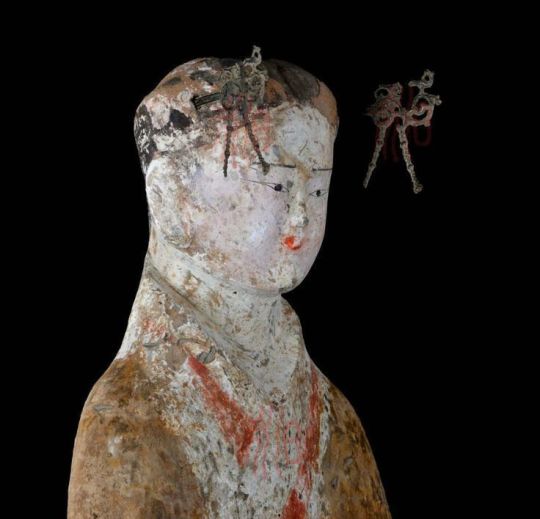
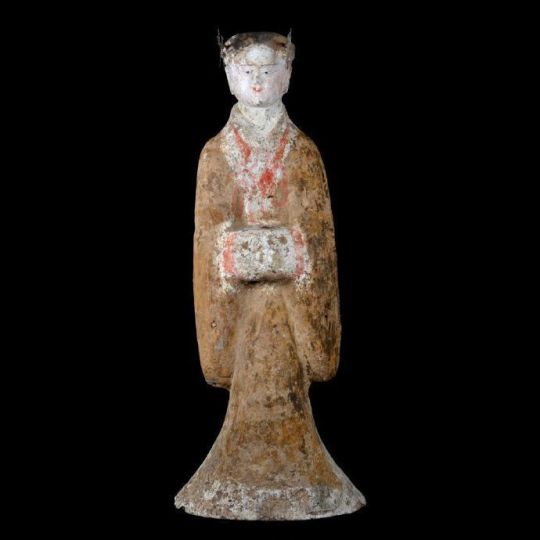
・Plain yarn garment (straight) Mawangdui No. 1 Han Tomb (Xinzhui)
material: silk,size: dress length 132 cm, sleeve length 181.5 cm
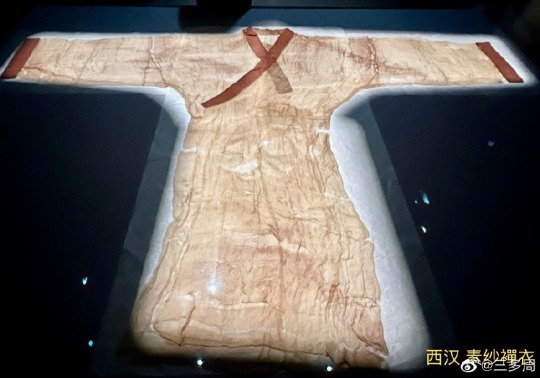
[Hanfu · 漢服]Chinese Han Dynasty Traditional Clothing Hanfu Photoshoot【风露霓裳】
_______
📝 Plan: 成都临溪摄影
📸Photo: 何力
💄Stylist: 百丽 熊熊
🧚🏻 Model: 弋歌
🔗Weibo:https://weibo.com/1648616372/N3L7fw0hT
_______
#chinese hanfu#Han Dynasty#western han dynasty#chinese history#hanfu art#hanfu#chinese traditional clothing#chinese#chinese coustume#chinese relics#hanfu accessories#chinese culture#China History#hanfu photoshoot#chinese historical fashion#漢服#汉服#成都临溪摄影#何力#百丽 熊熊#弋歌#风露霓裳
260 notes
·
View notes
Text
planning a Shadowpeach arranged marriage au and the amount of research I’m doing into Han dynasty weddings is insane
Literally no one reading will know if it’s inaccurate but I don’t care. I’m looking up things in Chinese and google translating to get the good results.
29 notes
·
View notes
Text

2,000-Year-Old Giant Panda Skeleton Unearthed in Grave of Chinese Emperor
While excavating the tomb of an ancient Chinese emperor, archaeologists unearthed the skeleton of a giant panda, officials said.
The skeleton, which was in good condition, dates back around 2,000 years, according to an Aug. 2 news release from the Chinese Archaeology Network.
The tomb it was found in belonged to Emperor Wen, a ruler in the Han Dynasty who lived from 202 B.C. to 157 B.C, according to the British Museum.

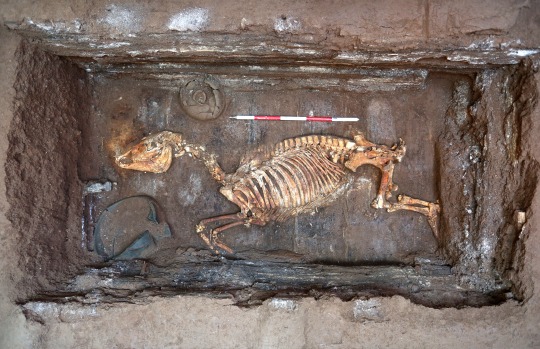

Wen was “singular in many respects,” according to a 2018 study published in the journal Archaeological Research in Asia. “He is known for the reform of the empire, and for his ‘frugality’ and concern for his people.”
And unlike many other emperors, he declined to build a “burial mound,” instead opting to construct his tomb inside of a mountain, according to the study.
Inside this tomb — located in Xi’an, a city in central China — archaeologists uncovered an animal sacrifice pit, which housed the panda bones.
In Han Dynasty China, like many other ancient societies, the dead were buried with many material goods, so they could be enjoyed in the afterlife, officials said.
Animals, including the panda, would have been entombed as part of an underground royal garden for the dead.
Additionally, the internment of animal bones was used to display power and wealth.
The panda has long held a unique place in Chinese culture, according to the Chinese Consulate in Calgary. The black-and-white animals traditionally symbolized peace and were once believed to have medicinal powers.

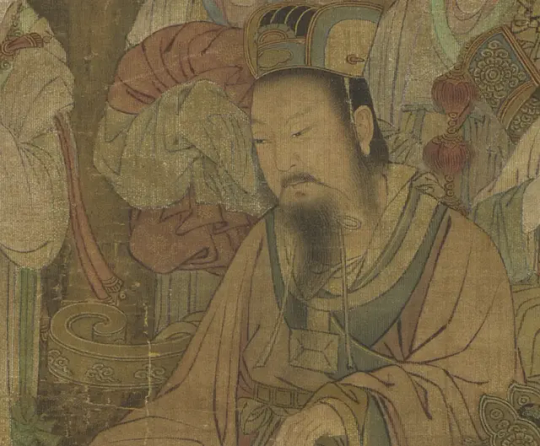

#2000-Year-Old Giant Panda Skeleton Unearthed in Grave of Chinese Emperor#China#Xi’an#Emperor Wen#Han Dynasty#ancient tomb#ancient grave#ancient artifacts#archeology#archeolgst#history#history news#ancient history#ancient culture#ancient civilizations#ancient china#chinese history#chinese emperor
133 notes
·
View notes
Text
Hello everyone! As a Chinese person interested in hanfu, I have a question. Does anybody know what crown is the Chinese philosopher Confucius wearing in these portraits? Thank you!
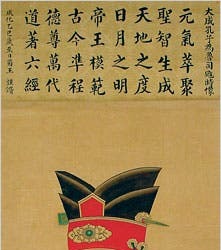

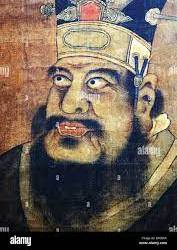
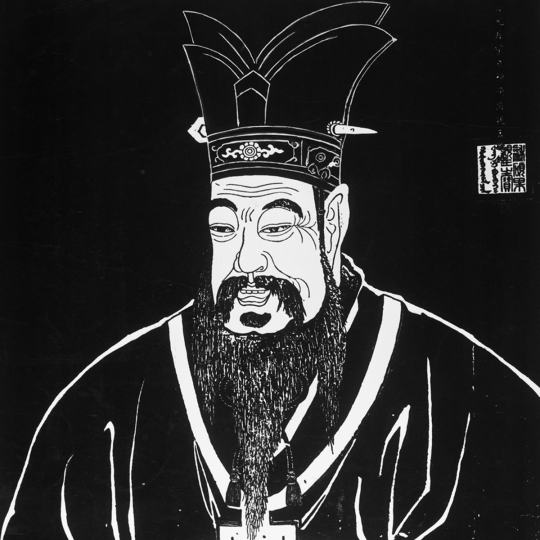
#hanfu#chinese#chinese history#ancient china#china#warring states era#warring states period#chinese fashion#hanfu accessories#hanfu movement#tang dynasty#han dynasty#qin dynasty#ming dynasty#chinese hanfu#chinese culture
172 notes
·
View notes